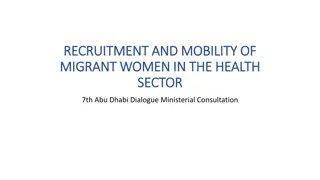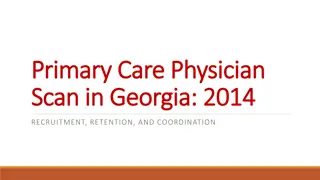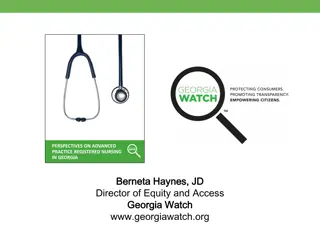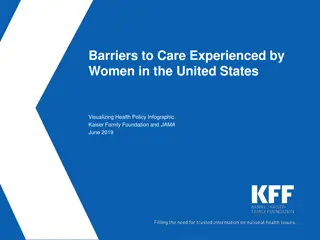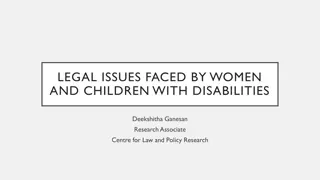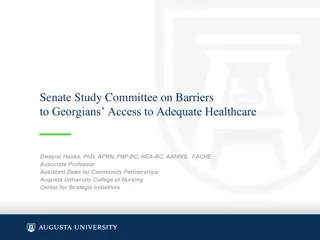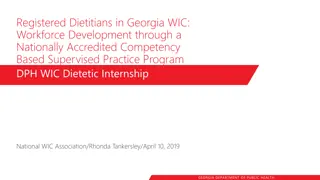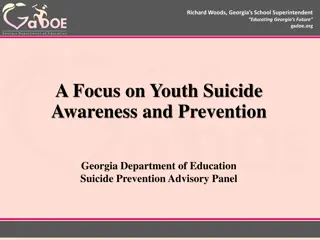Challenges and Opportunities in Women's Healthcare Access in Georgia
The presentation to the Senate Women's Adequate Healthcare Study Committee by Dr. Catherine Bonk sheds light on the crucial aspects of women's healthcare in Georgia. It addresses daily healthcare dilemmas for women across generations, the role of OBGYNs, chronic health issues, access challenges, and important facts related to women's health. The data highlights obstacles such as lack of obstetric care in numerous counties and limited access to OBGYN services, emphasizing the need for improved healthcare access to support women's well-being throughout their lives.
Download Presentation

Please find below an Image/Link to download the presentation.
The content on the website is provided AS IS for your information and personal use only. It may not be sold, licensed, or shared on other websites without obtaining consent from the author. Download presentation by click this link. If you encounter any issues during the download, it is possible that the publisher has removed the file from their server.
E N D
Presentation Transcript
WOMENS HEALTHCARE IN GEORGIA PRESENTED TO: SENATE WOMEN'S ADEQUATE HEALTHCARE STUDY COMMITTEE BY: DR CATHERINE BONK PRESIDENT GEORGIA OBGYN SOCIETY SEPTEMBER 14, 2015
DAILY DILEMMAS IN HEALTHCARE FOR A WOMAN Grandmother Mother Teen
A DAY IN THE LIFE OF A PRACTICING OBGYN
HOW DO YOU BECOME AN OBGYN? 4 years college 4 years medical school 4 years residency training as an OBGyn Average Debt for an OB: $250,000
OBGYN RESIDENCY EDUCATION PROGRAMS IN GA Program Graduates Per Year 9 Emory School of Medicine, Atlanta Morehouse School of Medicine, Atlanta 3 Georgia Regents University School of Medicine, Augusta 3 Mercer University School of Medicine, Macon 4 Mercer University School of Medicine, Savannah 4 Approximately 23 graduates per year Only 50% stay in Georgia
WHAT DOES THE OBGYN DO? Primary care physician for: Female teens Women in their adult years. Responsible for bringing the next generation of citizens into the state healthy
CHRONIC PROBLEMS Obesity Cardiovascular Disease Diabetes Mental health issues Unplanned pregnancies
WHO HAS ACCESS TO AN OBGYN? 40+ Counties have no obstetrical care of any kind No OBGyn No Family physician doing OB No Midwife 70+ counties have no OB physician
IMPORTANT FACTS Research shows: Inter conceptual health between pregnancies is critical to good pregnancy outcomes for mother and baby Women need access to healthcare throughout their lives to remain healthy and well 51.2% of the population of Georgia is female
MEDICAID FOR WOMEN IN GEORGIA Medicaid covers 50-60 percent of deliveries in GA (depending on the year) Cover the woman for: pregnancy 60 days after delivery then uninsured P4HB (if enrolled) Visit for birth control Limited services
CONSEQUENCES OF THE SYSTEM Lack of health care and health insurance between pregnancies Unhealthy women Chronic diseases not under control At risk pregnancy Poor pregnancy spacing Unplanned pregnancies Results: Poor pregnancy outcomes Sick newborns with long term problems Poor maternal health long term
CONSEQUENCES OF THE SYSTEM Private Insurance Insurance does not equal coverage High deductibles High co-pays Non-covered services Results: Substandard products Narrow networks Inadequate care Lack of specialty care
WHY FIX THE PROBLEM? Effects half the population of Georgia
HOW CAN WE FIX THIS? EXPAND EDUCATION More OB residency programs Loan repayment Another midwifery program in rural GA Re-entry programs for Gyns in good standing to return to OB GBPW funding for OBGyn slots similar to FP slots
HOW CAN WE FIX THIS? HELP RURAL GEORGIA Telemedicine Keep more Providers in State: 50% new grads leave Increase use of CNMs Incentives to practice in rural areas Adequate funding for Public Health programs Keep hospital OB units open Understand rural problems Strengthen support systems
HOW CAN WE FIX THIS? STRENGTHEN AND SUPPORT OUR CURRENT WORKFORCE Adequate reimbursement (rural practice is a small business) More focus on education/communication to practicing OBGyns (Large diverse state) Stabilized malpractice climate Nonthreatening political climate
HOW CAN WE FIX THIS? STATE LEVEL EFFORTS State level advisory committee Organized planning to assure that obstetric and women s healthcare remains accessible, particularly in rural GA Reorganized and strengthened Regional Perinatal Center System for high risk care Public Health campaigns to improve public education
THANK YOU Discussion and Questions



